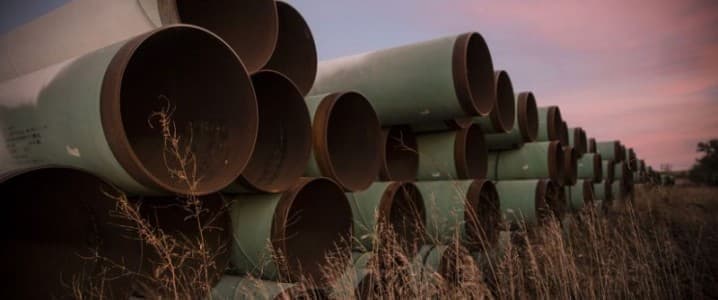
The United States became the largest natural gas producer in a matter of years, also turning into one of the top three LNG exporters. Gas production and demand are both on the rise, and the EIA projects that output will hit a record high this year. At the same time, however, the infrastructure necessary to bring this gas from the producer to the consumer has been slow to catch up with demand. The reason: political opposition that, the industry says, could have a negative impact on the U.S. economy.
Last month, a senior executive from Williams, the natural gas transport major, told Energy Intelligence that regulatory rules are stifling the necessary expansion of the nation’s gas pipeline network. And he wasn’t the only one.
The availability of pipelines to get the product out of the shale gas fields in particular–there’s only so much they can get to market without more of that infrastructure. So for that reason, you might have inactive wells,” said the president of the Potential Gas Committee, also last month, summarizing one of the biggest challenges for U.S. gas.
The industry has been complaining of obstacles being put in the way of new gas pipelines for years, as the Biden administration made no secret of its dislike for the hydrocarbons industry, and as state governments in some parts of the country doubled down on their efforts to reduce their reliance on oil and gas—risking their energy security in the process.
One notorious case was that of the Williams Northeast Supply Enhancement pipeline, which New York Governor Andrew Cuomo killed back in 2020, citing climate change concerns. At the same time, the utility operating in the area where the gas pipeline would have passed imposed a moratorium on new hookups citing insufficiency of supply. The utility, National Grid, said the new pipeline had been crucial to ensure supply. The response? Cuomo told National Grid to find gas or lose its license.
Now, for some cities and states talking about—and some introducing—gas stove bans, the challenging situation has become even more problematic for the gas industry. And it has become more problematic for the U.S. economy.
“The industrial world that we enjoy now is severely compromised because of the lawsuits, the pushback and the movement to cancel energy infrastructures and modern society. We’ve run out of flexibility,” the chief executive of EQT, the largest natural gas producer in the U.S., Toby Rice, told the Financial Times in an interview this month.
Rice continued to say that there is plenty of natural gas yet to be extracted from the U.S. shale patch, but the shortage of pipelines was compromising that production growth. The remarks echo earlier comments made by Rice that pipeline capacity in the Appalachian Basin had “hit a wall” due to environmentalist opposition, which has led to the suspension of new pipeline projects.
The discrepancy between demand for gas and the infrastructure necessary to take it from producer to consumer could become a problem for the country’s economy—Germany is a recent and quite telling example of the importance that sufficient gas supply has for a big economy with a large industrial portion. This discrepancy could also become an international problem. Because if the shortage of pipelines persists, all that additional LNG export capacity may not materialize for lack of sufficient feed gas supply. And that would become a problem for much more than just the U.S.
A forecast by East Daley Capital sees U.S. LNG exports doubling to 26 billion cu ft daily by 2030. Wood Mackenzie sees U.S. LNG exporters potentially adding between 70 and 190 million tons annually in new capacity by 2030. This is a massive amount of LNG. And it has to come from somewhere, by pipeline. In the absence of such pipelines, this additional capacity may never materialize. To illustrate the challenging environment in which gas suppliers operate, EQT’s Rice pointed out the case of the Mountain Valley Pipeline. Hit by a series of delays because of environmentalist opposition, the pipeline was finally cleared for construction.
What it took for this to happen was a special law passed in Congress after Senator Joe Manchin intervened in its favor. Rice’s comment? Needing a special law to build a single pipeline “should scare the hell out people”. Indeed, Rice went as far as to say that some parts of the U.S. could find themselves in a shortage situation similar to the one Europe experienced last year.
What makes the U.S. situation a lot more frustrating, however, is that it has the domestic supply of gas, while Europe does not, which makes it permanently dependent on external suppliers. The U.S. has the gas and the companies to take it out of the ground. All it needs are some more pipelines to take that gas from the well to the consumers who need it. And they will continue needing it for quite a while yet. Just look at Europe.
Source: https://oilprice.com
